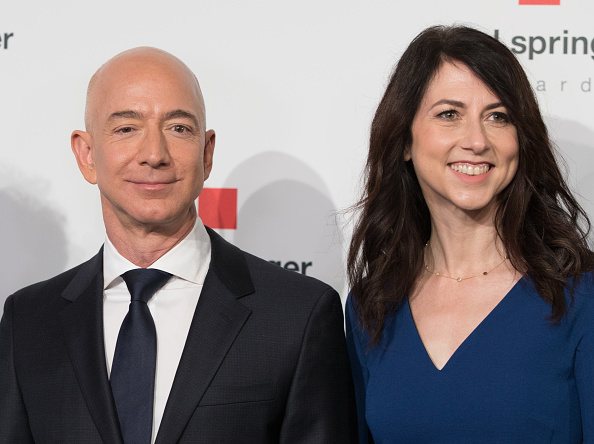Billionaire Philanthropist MacKenzie Scott Files for Divorce From Second Husband
The ex-wife of Amazon founder Jeff Bezos married Dan Jewett last year
Billionaire philanthropist MacKenzie Scott, the former wife of Amazon.com Inc. founder Jeff Bezos, has filed for divorce from her second husband, according to court records.
Ms. Scott filed a petition for divorce from Dan Jewett in King County Superior Court in Washington state, according to a filing dated Monday. She had married Mr. Jewett, then a teacher at a private Seattle school, last year. She and Mr. Bezos divorced in 2019 after 25 years of marriage.
Mr. Jewett agreed to the divorce, according to court records. The couple already had a separation contract, which specifies how their debts and liabilities would be divided, the records said.
Ms. Scott and her lawyer, as well as Mr. Jewett and his lawyer, couldn’t immediately be reached for comment. Amazon didn’t immediately respond to a request for comment on behalf of Mr. Bezos.
Ms. Scott has given away billions of her wealth since divorcing Mr. Bezos. In 2019, she joined the Giving Pledge, pledging to give away a large chunk of her wealth. Some of the organisations that received donations since Ms. Scott’s and Mr. Jewett’s marriage thanked both of them.
In a nine-month period, Ms. Scott donated $3.86 billion to 465 different organisations, including the Boys & Girls Clubs of America and the Planned Parenthood Federation of America.
Ms. Scott has a net worth of $28.9 billion, according to the Bloomberg Billionaires Index, making her the 39th richest person in the world. That number has been falling as she has been donating much of her wealth. At one point in 2020, her net worth was as high as $67.4 billion, according to the index.
Both Ms. Scott and Mr. Jewett live in King County in Washington state, according to the divorce filing. The couple was married in the state of California.
Ms. Scott helped Mr. Bezos in founding Amazon. She owned a roughly 2.9% stake in Amazon as of February of this year, according to FactSet, but Mr. Bezos retained those shares’ voting rights.
She and Mr. Bezos have four children together.
 Copyright 2020, Dow Jones & Company, Inc. All Rights Reserved Worldwide. LEARN MORE
Copyright 2020, Dow Jones & Company, Inc. All Rights Reserved Worldwide. LEARN MORE
This stylish family home combines a classic palette and finishes with a flexible floorplan
Just 55 minutes from Sydney, make this your creative getaway located in the majestic Hawkesbury region.
Continued stagflation and cost of living pressures are causing couples to think twice about starting a family, new data has revealed, with long term impacts expected
Australia is in the midst of a ‘baby recession’ with preliminary estimates showing the number of births in 2023 fell by more than four percent to the lowest level since 2006, according to KPMG. The consultancy firm says this reflects the impact of cost-of-living pressures on the feasibility of younger Australians starting a family.
KPMG estimates that 289,100 babies were born in 2023. This compares to 300,684 babies in 2022 and 309,996 in 2021, according to the Australian Bureau of Statistics (ABS). KPMG urban economist Terry Rawnsley said weak economic growth often leads to a reduced number of births. In 2023, ABS data shows gross domestic product (GDP) fell to 1.5 percent. Despite the population growing by 2.5 percent in 2023, GDP on a per capita basis went into negative territory, down one percent over the 12 months.
“Birth rates provide insight into long-term population growth as well as the current confidence of Australian families,” said Mr Rawnsley. “We haven’t seen such a sharp drop in births in Australia since the period of economic stagflation in the 1970s, which coincided with the initial widespread adoption of the contraceptive pill.”
Mr Rawnsley said many Australian couples delayed starting a family while the pandemic played out in 2020. The number of births fell from 305,832 in 2019 to 294,369 in 2020. Then in 2021, strong employment and vast amounts of stimulus money, along with high household savings due to lockdowns, gave couples better financial means to have a baby. This led to a rebound in births.
However, the re-opening of the global economy in 2022 led to soaring inflation. By the start of 2023, the Australian consumer price index (CPI) had risen to its highest level since 1990 at 7.8 percent per annum. By that stage, the Reserve Bank had already commenced an aggressive rate-hiking strategy to fight inflation and had raised the cash rate every month between May and December 2022.
Five more rate hikes during 2023 put further pressure on couples with mortgages and put the brakes on family formation. “This combination of the pandemic and rapid economic changes explains the spike and subsequent sharp decline in birth rates we have observed over the past four years,” Mr Rawnsley said.
The impact of high costs of living on couples’ decision to have a baby is highlighted in births data for the capital cities. KPMG estimates there were 60,860 births in Sydney in 2023, down 8.6 percent from 2019. There were 56,270 births in Melbourne, down 7.3 percent. In Perth, there were 25,020 births, down 6 percent, while in Brisbane there were 30,250 births, down 4.3 percent. Canberra was the only capital city where there was no fall in the number of births in 2023 compared to 2019.
“CPI growth in Canberra has been slightly subdued compared to that in other major cities, and the economic outlook has remained strong,” Mr Rawnsley said. “This means families have not been hurting as much as those in other capital cities, and in turn, we’ve seen a stabilisation of births in the ACT.”
This stylish family home combines a classic palette and finishes with a flexible floorplan
Just 55 minutes from Sydney, make this your creative getaway located in the majestic Hawkesbury region.






















